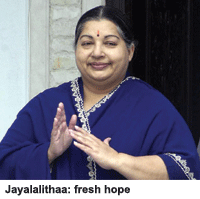The stunning landslide victory of the J. Jayalalithaa-led All India Anna Dravida Munnetra Kazhagam (AIADMK) alliance in the Tamil Nadu legislative assembly elections, whose result was announced on May 13, has been widely welcomed by the academic community in this southern seaboard state (pop. 72 million) which prides itself for its high literacy (80 percent) and standards of school and collegiate education. The return of Jayalalithaa, who has served two terms as chief minister (1991-96 and 2001-2006) and is widely perceived as a liberal, has infused educationists despairing over the regressive leveling-down education policies of the ousted Dravida Munnetra Kazhagam (DMK) government, with fresh hope.
 As if in answer to their prayers, among the decisions taken at its first cabinet meeting by the newly sworn-in AIADMK government was to postpone implementation of samacheer kalvi or common school curriculum, introduced by the ousted DMK government (through the Uniform System of School Education Act, 2010), which mandates a common syllabus and curriculum for all 52,303 government primaries and secondaries, and 10,934 private unaided schools affiliated with the Tamil Nadu State Board of School Examinations (TNSBSE). The samacheer kalvi syllabus and poor quality textbooks, introduced in June 2010 for classes I and VI and proposed to be implemented for classes II-V and VII-X during the current academic year 2011-2012, have been widely criticised by the state’s 5,934 private unaided matriculation schools affiliated with the Board of Matriculation Schools (which follow a unique curriculum till class X and adopt the TNSBSE syllabus at the Plus Two stage) in particular.
As if in answer to their prayers, among the decisions taken at its first cabinet meeting by the newly sworn-in AIADMK government was to postpone implementation of samacheer kalvi or common school curriculum, introduced by the ousted DMK government (through the Uniform System of School Education Act, 2010), which mandates a common syllabus and curriculum for all 52,303 government primaries and secondaries, and 10,934 private unaided schools affiliated with the Tamil Nadu State Board of School Examinations (TNSBSE). The samacheer kalvi syllabus and poor quality textbooks, introduced in June 2010 for classes I and VI and proposed to be implemented for classes II-V and VII-X during the current academic year 2011-2012, have been widely criticised by the state’s 5,934 private unaided matriculation schools affiliated with the Board of Matriculation Schools (which follow a unique curriculum till class X and adopt the TNSBSE syllabus at the Plus Two stage) in particular.
Therefore, the providential and unexpected ouster of the DMK government has come as a pleasant surprise to private school managements especially since the new AIADMK government has swiftly constituted an expert committee to review the samacheer kalvi syllabus. Some educationists are hoping the committee will recommend scrapping of the common school syllabus initiative in toto and restore the status quo ante.
That the new government deplores the DMK government’s interference with Tamil Nadu’s school syllabuses and systems was made clear by the new minister of school education, C.V. Shanmugham, who has ordered that a new Tamil Nadu state anthem penned by former chief minister M. Karunanidhi and printed in all 90 million samacheer kalvi textbooks including class X texts where his personal achieve-ments are also provided as extra reading material, is deleted forthwith.
Meanwhile the new govern-ment has decreed that until the expert committee submits its report, all government and private schools should conti-nue to follow the old textbooks for the academic year 2011-2012. Moreover to give the Tamil Nadu Textbooks Society and private printers enough time to reprint more than 65 million old textbooks, the commencement of the new school year has been post-poned from first week to June 15.
“All stakeholders in private schools have denounced samacheer kalvi because it will surely dilute our high standards and usher in stifling regulations at a time when autonomy, flexibility, accreditation and student-centred education are preferred norms. We are also hopeful the new govern-ment will revise the tuition fees structure imposed upon us by the DMK government to enable us to provide high quality education and school infrastructure and pay our teachers well,” says Dr. Alfred Devaprasad, president and chief of the Alpha Group of Institutions, Chennai.
Informed monitors of education in the state believe this is a good time to drastically reduce political interference in education. “Education is too important an issue with massive long-term implications for political parties to use for scoring political points. Unfortunately, the election manifesto of the AIADMK has almost nothing to say about education. Therefore the probability is that the expert committee’s mandate is to reverse DMK policies rather than improve Tamil Nadu’s slipping school system,” says Dr. Bernard D’Sami, associate professor in the department of history and international affairs at Loyola College, Chennai.
Nevertheless the dominant mood in the academic community is upbeat and hopeful of changes for the better. The outcome of the 14th Tamil Nadu assembly elections is being interpreted as an indicator that the electorate has ignored the DMK’s populism and freebies, voting instead for better education and medical facilities, improved infrastructure and adequate power supply. The general expectation is that in her third and probably last innings as chief minister, Jayalalithaa will rise to the occasion.
Hemalatha Raghupathi (Chennai)